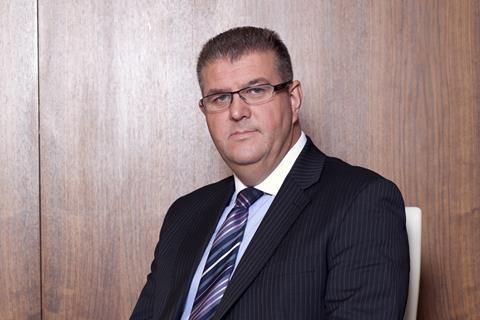With the RICSâ overseas membership up to 35,000, chief executive Sean Tompkins isnât about to be blown off course by parochial critics back home

Sean Tompkins knows how to drop a name. The chief executive of the RICS is recently back from a prime minister-led trade mission to Brazil, which also featured bosses from firms including Foster + Partners, Laing OâRourke and Mott MacDonald. Exactly the sort of thing you would expect the RICS - which is trying to establish the surveying professions across the world - to attend. But it almost got him in hot water at home.
âDavid Cameron was good enough to get me out of a personal hole. It was my daughterâs birthday and I missed it,â he admits ruefully. âSo he wrote a personal excuse note - âIâm very sorry your dad missed your birthday, it was all my fault, David Cameron. He was just promoting the British professions in Brazil.ââ
In case you were wondering, the apology was accepted.
But two years into his role, itâs clear Tompkins (who says he hates flying) is still clocking up air miles promoting surveying around the world. He says there is evidence the strategy is paying off, with RICS standards taking root in some of the worldâs most rapidly developing economies - including China and India - and RICS membership hitting 35,000 overseas for the first time.
But Tompkins is the first to admit that not all the organisationâs 75,000 members in the UK are supportive of the RICSâ international expansion plans. Whatâs more, the RICS has been hit by a series of domestic controversies over the past year - from allegations of conflicts of interest in its dispute resolution service to outpourings of anger over membership fee rises - that have rocked confidence in body.
From his office at the RICSâ international headquarters in Londonâs Parliament Square, Tompkins confidently sets out the case for continued global growth and explains how the RICS is getting its house in order at home.
Man on a mission
In 10 to 20 yearsâ time, the RICS will have as many members overseas as in the UK, Tompkins believes. The bodyâs strategy for getting there is to set up across the world - focusing on the most rapidly developing economies - and establish surveying standards he says are âmassivelyâ in demand overseas. There are now 10,000 RICS members in the BRIC countries alone, he says.
The RICS is now set up in 27 countries and Tompkinâs strategy is to generate more demand for the RICSâ standards. Much of Tompkinsâ time is spent âworking with employers, end-users or governments to get them to endorse or accept RICS standardsâ, he says.
There are some notable successes, particularly in the property sector, where he says RICS standards are now accepted as âthe top levelâ for property brokerages throughout Europe.
The RICS is in discussions with the Indian government on âhow to train the 500,000 construction and property professionals they believe they are short of to deliver their next five to 10 year [infrastructure] planâ. In China, Tompkins recently met the head of the professional services regulator to discuss how to incorporate RICSâ measurement and embodied carbon standards in the countryâs construction market. He says China wants to create âsomething not too dissimilar to the RICSâ to cover âthe whole life-cycle of propertyâ.
Weâve almost got to a point where weâre taking professions for granted in the UK. Thatâs not happening anywhere else
He dismisses his âparochialâ critics, saying Brits have a problem with selling themselves abroad. âWeâve almost got to a point where weâre taking professions for granted [in the UK],â the boss of the 143-year-old body says. âI can promise you thatâs not whatâs happening anywhere else. They are massively in demand, highly valued, nurtured, supported and invested in.â
Indeed, he says the expansion drive is as much about promoting the surveying profession at home as abroad, and that the economic imperative for doing so is clear. âOur economic future in the UK will be based on trading knowledge around the world for capital,â he says.
He says the RICS is politically neutral, but he backs Cameronâs international trade push. âIâd like the leader of my country to be going out and linking me up with the rest of the world, and Iâm hoping chartered surveyors would like the leader of their profession to be doing the same.â

The home front
Back in the UK, Tompkins accepts that it is a tough market for QSs. He says the RICS can help by driving best practice in the areas posing the biggest challenges for firms - particularly around technology, BIM and developing multidisciplinary skills, such as adding project and programme management skills to cost consultancy.
One way of doing this is to be at the heart of government policy, Tompkins says. He says the RICS was one of the main voices lobbying for a construction strategy and a construction adviser, and now these have been implemented, the RICS can make a greater impact on policy. He points to developments in cost benchmarking - the government is developing a database of costs across all building projects to drive savings - and embodied carbon as areas âwhere people are starting to think differentlyâ.
He gives robust responses when questioned on the corporate controversies that have hit the RICS in the past year. Last November șĂÉ«ÏÈÉúTV reported that two senior members of its dispute resolution service, Wajid Khan and Carol Goodall, had left the RICS over an alleged conflict of interest involving an RICSâ claim that they used internal information to set up a now-defunct website about dispute resolution specialists, First4ADR.com. Law firm Field Fisher Waterhouse was drafted in to investigate the service and finally gave it a clean bill of health in March.
Tompkins says the RICS has put in place new procurement and financial procedures since then and is confident the controversy is âbehindâ the RICS.
And he is unapologetic about fee increases. RICS members took to social networks to complain of average membership fee rises of 4.6% this year - at a time when the market is stagnant. Tompkins says the increases are justified as âthe profession is not dying, in fact it is massively expanding because of its future [international] potentialâ, and points to operational savings of ÂŁ750,000 last year that have lightened the burden on members.
Call for help
Tompkins is a natural salesman - no surprise, given that he was head of marketing at global insurance giant Prudential before he joined the RICS - and he is convinced the RICS needs to be sold better at home and abroad.
But he is also concentrating on being a good listener, as well as a talker. Under his leadership the bosses of surveying firms have a say in his annual performance review for the first time. Asked whether they gave him good feedback this year, he replies with a laugh: âIâm still here.â
He closes the interview with a plea to the wider profession to get more involved with the organisation: âIf people donât think Iâm doing a great job Iâd rather they told me now than three years down the line. You need to help me - it is not a one-way street.â


























No comments yet